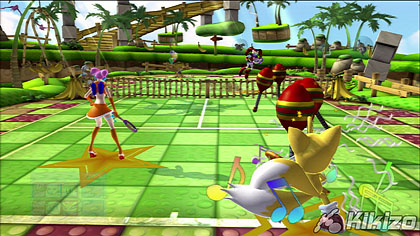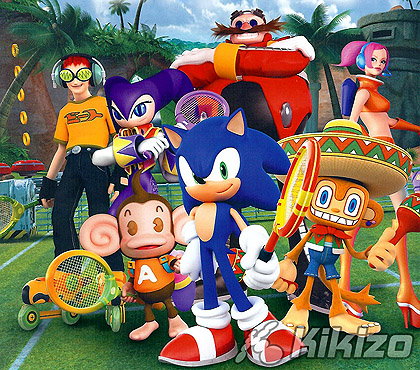Interview: Sega Superstars Tennis
Sumo Digital casts a Sega dream with Kikizo. Steve Lycett on working with Sega Japan, Sega fanboys and OutRun3.
By Adam Doree
These days it takes quite a lot to get our fanboy juices flowing, but the combined power of Sega, Sumo Digital and arguably gaming's best back catalogue of characters together in one title is enough to do it this month, with the release of Sega Superstars Tennis.

Sheffield, UK-based Sumo Digital won acclaim and adoration in 2004 when it showed off its conversion of OutRun2 for the Xbox. Turning in a perfect conversion of the coin-op, this previously unheard of studio had proven its mighty technical competence and perfect handling of Sega design sensibilities in one fell swoop.
Since then, the company has worked with Sega again on home versions of Virtua Tennis and OutRun 2006: Coast 2 Coast. And it was also to work on a Wii-specific version of Virtua Tennis as well, until Sega of Japan asked Sumo to stick some Sonic characters into the game as a bit of a bonus. Suddenly it all clicked - let's put loads more Sega into this, they all thought - and Sega Superstars Tennis was born.
The result is the union of many of Sega's best loved characters in one slick tennis game, with the sort of attention to detail and fan service that really is first class in the industry. We recently caught up with Sumo Digital producer Steve Lycett for an interesting chat about the making of the game, as well as some half-assed journalism into the possible release of OutRun3. Believe.
![]()
Kikizo: Can we just clear up the naming issues with House of the Dead and Virtua Cop, as they have been renamed to Curien Mansion and Virtua Squad, because of some German legal requirements. But I don't understand why everyone else has to change for Germany - the original games are named properly everywhere else?
Lycett: It's crazy; basically the situation is House of the Dead and Virtua Cop are banned in Germany. And once a game's been banned, it's banned forever. From our point of view, we've done the game on five platforms, we'd have had to do a separate German SKU; it would have been quite a bit of extra work because we'd have to go past things and change the logos and artwork. And so between us and Sega, we decided to just compensate across all of Europe and so it turned out to be Curien Mansion and Virtua Squad. But I think it's called Virtua Squad in some territories anyway.
Kikizo: On PC it was Virtua Squad I think. But I still think it's ridiculous, I mean it was the games' overall content that was originally banned - not the games' actual names! The visual themes are the same. Isn't this just red tape nonsense?
Lycett: Yeah, but even though the games are totally different and we're not having blood and that, and the zombies, we had to make them sort of not quite so scary! I don't really understand much else behind this, but this is just what we've been told to do. It's a shame but when we talk about it, we still just call it House of the Dead and Virtua Cop.
Kikizo: And it's not like House of the Dead 2 and 3 coming out for the Wii are renamed everywhere because of this. Censorship, eh? Load of bollocks. So anyway, how much is in there in terms of hidden content and stuff, have you made a point of including hidden stuff like they've done big time in Smash Bros. Brawl?
Lycett: We've put all kinds of stuff in there! Some characters, even though you don't get to play as them, we've included them as a fan service; we've got Big the Cat for example, there's Blaze, Knuckles, Silver the Hedgehog, all the basic stuff, there's the flagman on the OutRun court - these aren't playable characters, they're stuff we kind of 'snuck in'! It's not what someone who's not used to Sega stuff is really going to recognise, but it was important for us to kind of give as much fan service as we could. I mean we get to work on something like this once in a lifetime - maybe twice if we're lucky! So you go to town with it, when you get the chance. It's stuff we loved as kids. When you start the game you start off with about fifty per cent of all the content - half the mini games, half the stuff in Superstars mode, half the characters, and when you play through Superstars mode you get everything else. I'm not saying that's how you get absolutely everything, but there's a lot to discover. It's a nice reward structure basically.
Kikizo: How easy or hard has it been to get to use different bits of Sega IP from Japan, I mean I would imagine that the level of trust you now have in using these assets from SOJ is a lot higher than the average outside developer because of the work you've done for them on OutRun2 and Virtua Tennis.
Lycett: It has. I mean, I think if we had come to this game as a new developer who had not worked with Sega before, it would have been quite difficult. But over the course of doing OutRun, Virtua Tennis and other games with Sega, there's a level of trust. To be honest, when we first set out doing it, we were just going to do Virtua Tennis on the Wii. We were doing a prototype, and just for a joke we put big heads on to the characters, to make them kidified. And Sega came to us and actually suggested we use Sonic characters. So we had a chat with the guys and came up with, if we're going to use Sonic characters, why don't we just use the whole line-up and make a proper Sega game?













 Satoru Iwata Video Interview - the late Nintendo president spoke with Kikizo in 2004 as 'Nintendo Revolution' loomed.
Satoru Iwata Video Interview - the late Nintendo president spoke with Kikizo in 2004 as 'Nintendo Revolution' loomed. Kaz Hirai Video Interview - the first of Kikizo's interviews with the man who went on to become global head of Sony.
Kaz Hirai Video Interview - the first of Kikizo's interviews with the man who went on to become global head of Sony. Ed Fries Video Interview - one of Xbox's founders discusses an epic journey from Excel to Xbox.
Ed Fries Video Interview - one of Xbox's founders discusses an epic journey from Excel to Xbox. Yu Suzuki, the Kikizo Interview - we spend time with one of gaming's most revered creators.
Yu Suzuki, the Kikizo Interview - we spend time with one of gaming's most revered creators. Tetris - The Making of an Icon: Alexey Pajitnov and Henk Rogers reveal the fascinating story behind Tetris
Tetris - The Making of an Icon: Alexey Pajitnov and Henk Rogers reveal the fascinating story behind Tetris Rare founders, Chris and Tim Stamper - their only interview? Genuinely 'rare' sit down with founders of the legendary studio.
Rare founders, Chris and Tim Stamper - their only interview? Genuinely 'rare' sit down with founders of the legendary studio. The History of First-Person Shooters - a retrospective, from Maze War to Modern Warfare
The History of First-Person Shooters - a retrospective, from Maze War to Modern Warfare